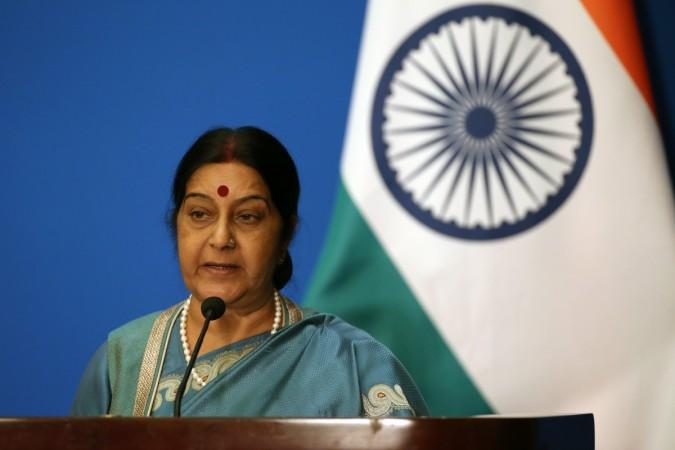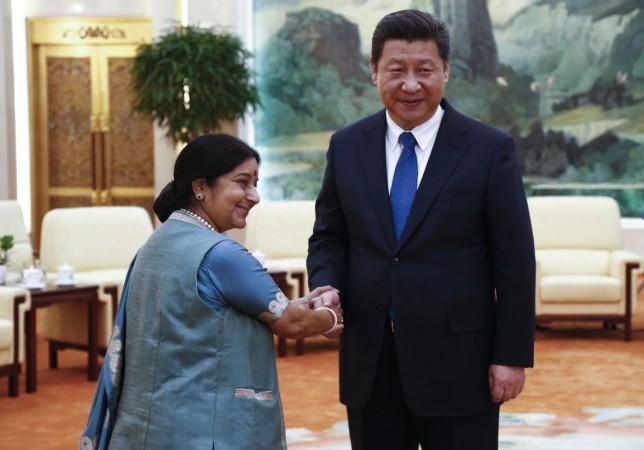External Affairs Minister Sushma Swaraj, in her speech in the Rajya Sabha on Thursday, slammed Congress vice-president Rahul Gandhi for meeting Chinese Ambassador to India Luo Zhaohui last month without first asking the government about their stand on the Sikkim standoff.
Also Read: Chinese media now blames 'rising Hindu nationalism in India' for Doklam conflict
"I was very saddened that the opposition, instead of considering the point of view of the Indian government, went and met the Chinese Ambassador. They did not try to understand the situation (the border standoff) from the Indian government, instead approached the Chinese counterpart to get their point of view," Swaraj said.
She added: "You should have first sought details from the government and then confronted the Chinese envoy. It is a matter of national sentiment (for India). You are the main Opposition party. You should speak with responsibility."
India and China have been involved in a major standoff for over a month now in the Doklam or Doka La region, also known as the India-China-Bhutan tri-junction, located along the Sikkim border. The conflict between the two countries is believed to be the most serious border dispute of late.
It all started when China accused India of violating border agreement saying Indian troops had allegedly entered the Doklam region and stopped the Chinese troops from constructing a road. India responded by saying the border dispute is yet to be resolved and China should "desist from changing the status quo."
India also accused China of building roads on the India-China-Bhutan tri-junction and its People's Liberation Army (PLA) of intruding into Indian territory in Sikkim and destroying bunkers, while China has claimed India is provoking them and the issue can be resolved only if India withdraws its troops.
Dialogue, not war, is the solution

Ruling out war as an option, Swaraj said that dialogue was the only way to resolve the standoff between India and China in the Doklam region in Sikkim. She said that the issue should be seen in the context of the "entire bilateral relationship".
Swaraj also highlighted that China has been contributing to India's growing economic strength. "For them, there's a lot at stake, risk here. They have been awarded many contracts," the minister told the House while replying to a discussion on India's foreign policy.
Swaraj added: "We are not negotiating only on Doklam, we are talking about bilateral relations in entirety. And a solution will also emerge from it... As far as economic strength is concerned, China is one of the leading countries among major contributors and economic partners. That's why Doklam is not the lone issue. So, a solution will definitely emerge if we engage in dialogue on bilateral relations."
When some members of the House said that India should be ready for war, Swaraj told them that the army was there if such a situation arose. The external affairs minister called for "patience" and "restraint in statements" in dealing with the matter.
"Patience and bhasha saiyam (restraint on statements) are very important to resolve the issue. If there is no restraint, it provokes the other side... Countries have armies to stay prepared for war. But war is not a solution to anything. Even after war, there has to be a dialogue. So have dialogue without a war," Swaraj said.
Will continue to engage with China through diplomatic channels

Referring to a 15-page statement released by China, Swaraj said that India "will continue to engage with the Chinese side through diplomatic channels to find a mutually acceptable solution on the basis of the Astana Consensus between our leaders... In keeping the traditional friendship with Bhutan, we will also continue to maintain close consultation and coordination with the Royal Government of Bhutan."
She also said that India's "concerns emanate from Chinese action on the ground, which have implications for the determination of the tri-junction boundary point between India, China and Bhutan and the alignment of India-China boundary in the Sikkim sector."
Both these aspects had been addressed in a written common understanding reached between the Special Representatives of India and China on the boundary question in December 2012.
"Point 13 of the common understanding states that 'The trijunction boundary points between India, China and third countries will be finalised in consultation with the concerned countries. Since 2012, we have not held any discussion on the trijunction with Bhutan. The Chinese action in the Doklam area is therefore of concern," she said.
Swaraj added: "The Chinese side has selectively quoted parts of Prime Minister Jawaharlal Nehru's letter of 22nd March, 1959 pertaining to the India-China boundary in the Sikkim sector. A full and accurate account of that letter would have also brought out Prime Minister Nehru's assertion that was clearly based on the boundary alignment as shown in our Indian published maps."
Terror and talks cannot go together
![Pakistani Rangers (REAR) and Indian Border Security Force (BSF) personnel fold their respective national flags as they perform during the daily beating of the retreat ceremony on the India-Pakistan Border at Wagah on February 20, 2017 [Representational Image] india pakistan](https://data1.ibtimes.co.in/en/full/648841/india-pakistan.jpg?w=593&h=412&l=50&t=40)
When asked about India's policy on Pakistan, Swaraj said that terror and talks cannot go hand-in-hand and that dialogue would take place that day Pakistan stopped promoting terror.
"Terror and talks cannot go together. The day they stop promoting terror, we will start the talks... You are asking what is our Pakistan road map? We had declared it even before the swearing-in... The story changed when Pakistan declared Burhan Wani (Hizbul Mujahideen commander who was killed in an encounter in July 2016) a martyr.
She added: "You say that India stands alone. This is far from the truth... You are saying that during the 1971 war, the US was with Pakistan and Russia was supporting India. Today both Russia and the US are supporting India. This reflects the success of our foreign policy."










